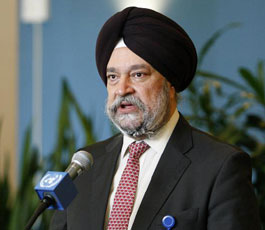
November 2012
The problem of piracy is no doubt an international one. India in particular suffers negative consequences, because they account for a relatively large proportion of global trade. The Indian Ambassador Hardeep Singh Puri took the time earlier this month to remind the rest of the world that it remains an international problem, not one just facing nations that specialize in maritime trade.
During a recent United Nations Security Council session about the issue of piracy, the ambassador spoke out:
“Piracy is not only a threat to the freedom of maritime navigation, it is causing destabilizing effect on global and regional trade and security.”
He continued, “The negative humanitarian impact of their threat on seafarers who are the lifeline of maritime shipping can no longer be ignored.”
India took the chance to organize this session as part of their turn at presidency of the 15-nation council. The country also made a “Presidential Statement” on piracy, which outlines the concerns of several countries about the well-being of the crew members aboard vessels that have been taken captive.
The Indian Ocean is larger than continental Europe, containing 2.8 million square miles of water. This makes the task of patrolling such a body of water difficult for even the impressive international fleet that has already been marshaled to address the problem.
Although the number of attacks have decreased in recent months, they are still prevalent and the violence continues to be as brutal as ever. As of August 2012, elven ships and nearly two-hundred hostages were still in captivity of pirates. This number includes 43 Indian citizens, who are amongst the most common nationality to crew international shipping vessels.
India has placed a high priority on addressing this issue for that specific reason, but also acknowledges the negative impact that piracy has overall on maritime trade and the costs of shipping. While the naval task force has had a positive impact, some worry that instead of stopping the problem they’re merely moving the pirates around the globe. Piracy has expanded further south and east before, and could potentially begin to hamper areas closer to the shores of Indian than those of Africa.
Puri spoke of the need to adopt a comprehensive counter-piracy strategy that deals with methods to deter pirates and punish those that have been caught.
“While we will continue with counter- piracy operations,there is also an urgent need for the international community to address the serious problem of seafarers being taken as hostages and consequent humanitarian problems faced by them and their families.
“It requires active cooperation in the sharing of information, evidence and intelligence in the investigation,prosecution and sentencing of suspected pirates as well as in efforts to achieve an early release of seafarers that are held hostage by pirates,” Puri said.
He elaborated that India believes part of this comprehensive approach involves with attacking pirates on land as well as at sea. He believes that identifying and disrupting the flow of finances to and from pirates is integral in stopping their networks from operating.
“This would require a broader criminal legislation,covering crimes of extortion, kidnapping, conspiracy, money laundering and financing of pirate activities, as also active collaboration and sharing of information and intelligence between private sector, states and relevant international organizations,” Puri said.
While a new government has recently be raised in Somalia, Puri expressed his hope that they would be more effective at countering the problem than local efforts had been in the past. He did acknowledge that building Somalia into a stable and self-sustaining nation would go a long way in addressing the root cause of the problem.
But for the immediate future, he outlined the most urgent issues that need to be dealt with. These included better cooperation between the countries of Africa, with a focus on better information sharing and maritime domain awareness.